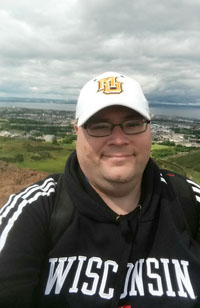A Midwestern Law Student’s Summer in the UK
 On top of a dormant volcano in Edinburgh, I took in the breath-taking view of the city (I also needed to take a breath after climbing for nearly two hours). I stayed on Arthur’s Seat for an hour, quietly reflecting about the previous two months and just how transformative they were for me.
On top of a dormant volcano in Edinburgh, I took in the breath-taking view of the city (I also needed to take a breath after climbing for nearly two hours). I stayed on Arthur’s Seat for an hour, quietly reflecting about the previous two months and just how transformative they were for me.
In fact, I’d go so far as saying this summer is fundamentally life-altering.
I had a rare opportunity to study law abroad in London with Syracuse University for seven weeks. I’ve rarely been outside of the Midwest, much less the United States. Even though I had a passport, I never found the right reason to go out of the country.
This experience was the right one.

 Our August student guest blogger will be 2L James Wold. James is originally from Janesville, Wisconsin, and has worked for over a decade as a sports editor. He is interested in sports law, particularly international sports law. Many thanks to our previous guest, 2L Erik Eisenheim.
Our August student guest blogger will be 2L James Wold. James is originally from Janesville, Wisconsin, and has worked for over a decade as a sports editor. He is interested in sports law, particularly international sports law. Many thanks to our previous guest, 2L Erik Eisenheim.